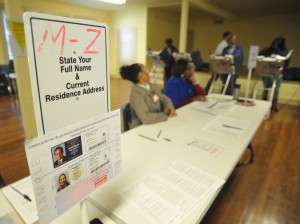Why Republicans Should Worry About Restrictive Voting Laws
< < Go Back
When The Times released its joint poll with CBS on race last week, its most eye-catching finding was that a majority of Americans have a negative view of race relations, a sharp reversal of expectations following Barack Obama’s election in 2008. But deeper in the results was a telling data point relating to the recent proliferation of state laws and policies having to do with access to voting, the topic of the cover story I wrote for this week’s magazine.
One question in the poll asked respondents whether they believed laws and policies that restrict absentee and early voting — overwhelmingly championed by Republicans — were devised to save money or to make it harder for minorities to vote. Nearly 80 percent of the black respondents who had an opinion on the new voting rules said they were devised to make it harder for minorities to vote; only about 20 percent of them said the changes were devised to save money. Among whites who had an opinion on the new rules and regulations, the split was fairly even: 45 percent said the rules were to save money, while 46 percent said they were to make it harder for minorities to vote. (Whites were more likely than blacks to say they had not heard enough to have an opinion, at 53 percent compared with 40 percent.)
This fits into a broader picture in which views of the fairness of the electoral process diverge sharply by race. Fifty percent of black voters, the New York Times/CBS poll found, believe blacks were most likely to encounter problems when voting. About 24 percent of whites agreed with them. Virtually no respondents of either race said white people were.
Matthew Dowd, a strategist for the 2000 and 2004 George W. Bush campaigns, told me. “Even if there’s a good intention and it’s not being done for some nefarious reason, it sends the wrong signal.”
Dowd argues that if Republicans are compelled to push voter-ID laws — which, in a Fox News poll last year, were favored by 75 percent of white respondents and 51 percent of black respondents — they should at the same time work to make voting easier. They could stop rollbacks in early voting, for instance, and introduce new conveniences as well. “That way you’re saying, ‘I want you to vote, but you have to have the ID.’ ”
So far, most of the Republican 2016 hopefuls who have weighed in on voting have done so on the side of more restrictions, not fewer, including Scott Walker, Rick Perry and Chris Christie. One notable exception has been Rand Paul; although he supports voter-ID laws, he also advocates early voting and told The Times last year, “I think it’s wrong for Republicans to go too crazy on this issue, because it’s offending people.”
Hillary Clinton, for her part, has called for a new federal voting law that would automatically register people to vote at age 18, and would require a mandatory 20-day early-voting period in all states. Its chance of passing in Congress, of course, is roughly zero.
More From The New York Times:




